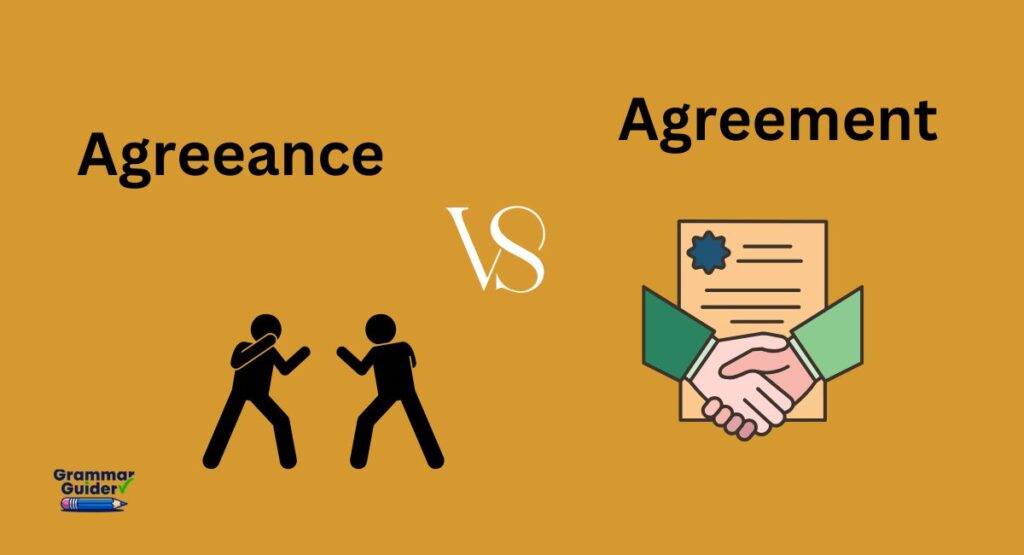Agreeance and agreement both mean coming together in thought or choice. Agreement is the standard term that is clear and common. It works well in both formal and informal writing. Agreeance is less common and sounds old-fashioned.
People use agreeance to show they feel in harmony or in a friendly understanding. But in most cases, agreement is better. It helps keep the meaning clear in formal documents and everyday conversations.
What do they Mean?
Agreeance and agreement both show that people think the same way. Agreement is common and formal, while agreeance is informal.
Agreeance
Agreeance is less common and used mostly in informal situations. It shows the state of being in agreement, but can sound old-fashioned. People use agreeance in friendly talks but don’t often use it in formal settings.
Agreement
Agreement is the more common and formal term. It means a mutual understanding between people. Agreement is used in both formal and informal settings. It’s the best choice when you want clear, professional communication, like in business or legal situations.
“Agreeance” or “Agreement”: Which One Should Be Used?
- Agreement is the better word to use most of the time. It is clear and easy to understand.
- Agreeance is rare and sounds old-fashioned. It works in very casual talks but not in formal writing.
Here is a simple guideline:
- Agreement can be used in both formal and informal situations like signing a contract or just talking.
- Using agreeance can confuse people because it’s not as common as agreement. Stick with agreement for clearer communication.
Agreeance vs Agreement:
| Feature | Agreeance | Agreement |
|---|---|---|
| Meaning | Agreeance means the feeling of being in agreement. | Agreement means a decision made by two or more people. |
| Formality | Agreeance is informal. | Agreement can be used in both formal and informal situations. |
| Commonness | Agreeance is less common. | Agreement is used more often. |
| Clarity | Agreeance can be unclear sometimes. | Agreement is clear and easy to understand. |
| Best Usage | Use agreeance for casual speech. | Use agreement for most situations. |
| Example | “There was agreeance on the idea.” | “They signed the agreement for the project.” |
Which One is More Acceptable?
Agreement is more acceptable because it is widely understood and works in both formal and informal settings. Agreeance is less common.
Here’s why:
- Wider Recognition: Agreement is the commonly accepted term. People easily recognize and understand it.
- Clarity: Agreement clearly expresses a shared understanding or decision. Agreeance may be unclear and could be confused with being simply agreeable.
- Formality: Agreement is appropriate for both formal and informal settings, while agreeance is usually used in casual conversations.
Why is There Confusion?
Agreeance and agreement are similar words but they have small differences. People get confused because agreeance is less common.
- Similar Roots and Meaning: Both agreeance and agreement come from the same root word “agree,” and both involve coming together in thought or action.
- Less Frequent Use of Agreeance: Since agreeance is not as commonly used as agreement, it can create confusion about when it’s the right word to use.
- Difference in Meaning: Agreement refers to the action or understanding, while agreeance describes the state of being in agreement.
- Challenges for Non-Native Speakers: The subtle difference in meaning between the two words may be hard to understand, especially for non-native speakers.
Breaking Down the Causes of Confusion
Breaking down the causes of confusion comes from a few reasons. Both agreeance and agreement have similar meanings making it easy to mix them up. Agreeance is less common so people often use it in the wrong way.
Another reason is that agreeance focuses on the state of being in agreement while agreement describes the action. This small difference can confuse people. Since agreement is clearer and used more often it’s safer to use it in most cases.

Read This Blog: Long Term or Long-Term: What’s the Right Choice in Writing?
Using “Agreeance” and “Agreement” in Sentences
When using “agreeance” and “agreement” in sentences, remember “agreeance” is informal and less common while “agreement” is formal and widely used in both casual and professional situations.
Agreeance (Informal)
- Agreeance is a word used to show people are in agreement about something.
- It is less common and used in informal speech.
- People use agreeance when talking casually, like with friends or family.
- It is not the best word for formal writing or business talks.
- Agreeance means the feeling of being happy or okay with a decision.
- In informal situations agreeance sounds okay but agreement is better in most cases.
Agreement (Formal & Informal)
- Agreement is a mutual understanding between two or more people.
- In formal situations, agreement is used for important decisions, like contracts.
- In informal situations, people use agreement for everyday decisions, like making plans.
- Agreement is clear and easy to understand, so everyone knows what is decided.
- You can have a formal agreement in writing, like in business or law.
- A informal agreement can happen with a simple handshake or just talking with friends.
Origins of “Agreeance” and “Agreement” Words
Agreement: The word agreement comes from the Old French word “agreement,” which appeared around the late Middle English period. It means both the action of agreeing and the result of it. Agreeance appeared in Scottish English in the early 15th century.
Agreeance: It focuses more on the state of being in agreement while agreement refers to the act and the result. Agreement is more common and used in both formal and informal situations. Agreeance is less formal and used in specific casual contexts.
FAQ’s
What is the difference between “agreeance” and “agreement”?
Agreement is widely used and formal; agreeance is informal and less common.
Which word is better to use, agreeance or agreement?
Agreement is the better choice for clear and professional language.
Is agreeance a correct word?
Yes, agreeance is correct but it sounds old-fashioned and informal.
Can I use agreeance in formal writing?
Agreeance is not recommended in formal writing; use agreement instead.
When should I use agreement?
Use agreement for any setting, as it fits both casual and formal communication.
Does agreeance mean the same as agreement?
They are similar but agreeance suggests the feeling of agreeing, while agreement is the actual decision.
Conclusion
both agreeance and agreement share the idea of people coming together in thought or decision. However agreement is the more common and accepted word. It works well in both formal and informal settings and is easily understood by everyone.
Agreeance is less common and mostly used in informal language. It describes the feeling of being in agreement rather than the act itself. For clear and effective communication agreement is the best choice. This word fits any situation whether you are speaking casually or writing formally.

Jacob Harrison is the seasoned writer behind Grammar Insights, with over nine years of experience in the field. Passionate about language, he shares practical tips and strategies to help readers enhance their grammar and writing skills. With a friendly approach, Jacob makes learning accessible and enjoyable for everyone.

